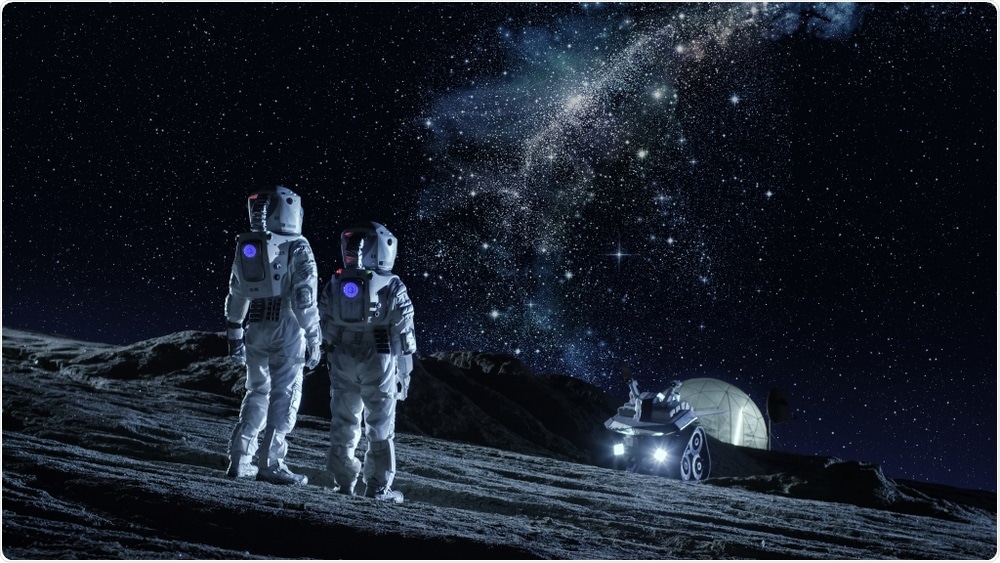Space travelers who spend long periods of time in space can experience health problems, such as adverse effects on metabolism, gastrointestinal health, muscle and bone health, mental health, and immunity. This may stop space travelers from undertaking long-distance missions, like landing on Mars.

Image Credit: Gorodenkoff/Shutterstock.com
But a new review published in Frontiers in Physiology—an open-access journal—emphasizes that supporting a healthy gut microbiome might safeguard space travelers from the rigidities of space travel. Therefore, identifying the kind of microbes that are the most beneficial and the best method to use them could be significant in reaching the Mars planet safely.
If humans were to ever walk on this red planet, they would need to tolerate a long space flight; however, space travel can have adverse health effects, possibly restricting how far humans can travel.
The microgravity setting can cause reduced bone mass and lead to muscle breakdown. It can also lead to nausea, implying that, at times, space travelers find it difficult to eat sufficiently, as space food does not taste that good. This diet change aboard a spaceship can disturb the gut microbiome, resulting in additional health problems.
Such factors can contribute to gastrointestinal and malnourishment problems like inflammation and infection. In addition, space travelers can experience metabolic disturbances, like reduced sensitivity to insulin. Other problems include cognitive decline, mental illness, and immune system deficits.
An increasing number of studies have targeted at gut microbes, and their function in space-related health, and this fact prompted Professor Silvia Turroni from the University of Bologna and Professor Martina Heer from the University of Bonn to pen this current review.
The team’s review addresses a range of studies, implying that disruptions in the gut microbiome take place while traveling to space. For example, a study identified that the gut microbiome of space travelers on the same mission turned more analogous to each other at the time of journey.
The team also detected an increased number of bacteria linked to intestinal inflammation but the number of microbes decreased in those associated with anti-inflammatory characteristics.
Changes in the microbiome are likely to lead to the breakdown of the balanced and complex relationship between microbes and their human host, with potentially severe repercussions on the functionality of body systems.”
Silvia Turroni, Professor, University of Bologna
The new review also showed that exploiting the gut microbiome may be a robust method to maintain health onboard a spacecraft.
The literature suggests that nutritional countermeasures based on prebiotics and probiotics hold great promise to protect space travelers.”
Silvia Turroni, Professor, University of Bologna
So, what are the factors that go into these microbial treatments? They can be as simple as nutritionally balanced meals, with plenty of fiber to trigger the metabolism of microbes in the gut. Other alternatives could be more targeted, such as microbial supplements, like bacteria that discharge immune-boosting substances or those that produce vitamins essential for bone growth.
As a matter of fact, there is a wide range of nutritional and pro-biotic options to safeguard space travelers from particular problems they may experience in space. But more work needs to be performed to understand which therapies are most effective and the best way to use them for every space traveler.
The well-being of the gut microbiome of space travelers should be among the primary goals of long-duration exploratory missions. To ensure the success of the mission, we must not overlook the myriad of microorganisms that reside in our gastrointestinal tract and make sure they are in balance.”
Martina Heer, Professor, University of Bonn
While upcoming space missions to Mars will certainly look for proof of microbial life on this red planet, the new review implies that it may be the homegrown bacteria that get people there.
Source:
Journal reference:
Turroni, S., et al. (2020) Gut Microbiome and Space Travelers’ Health: State of the Art and Possible Pro/Prebiotic Strategies for Long-Term Space Missions. Frontiers in Physiology. doi.org/10.3389/fphys.2020.553929.